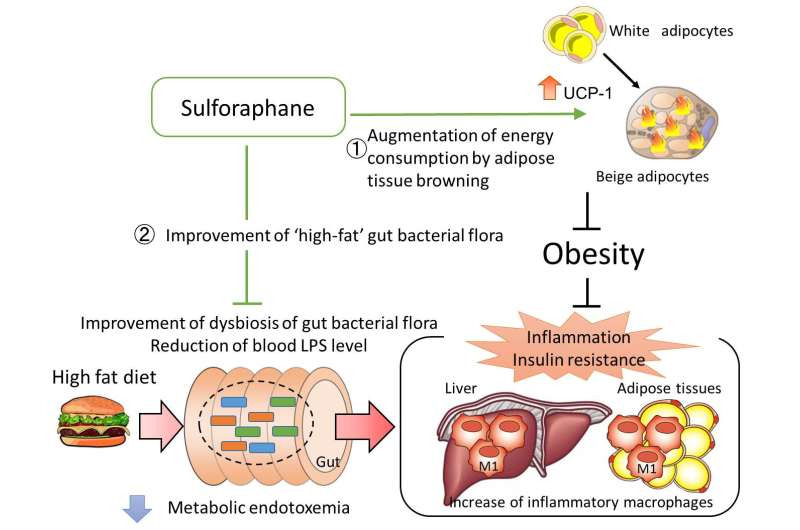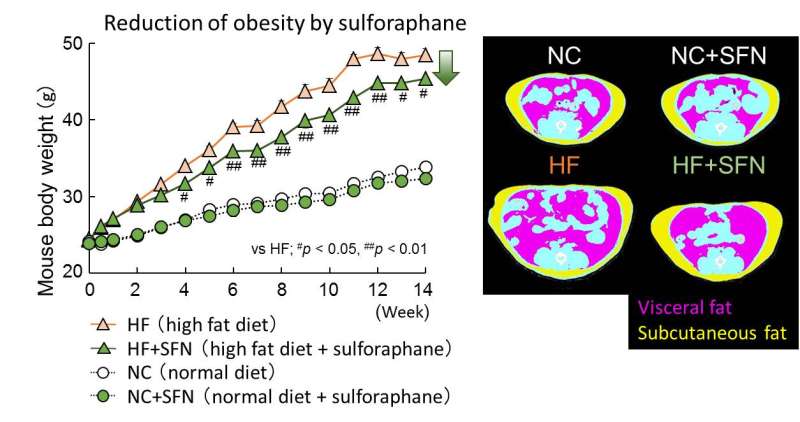Sulforaphane, a phytochemical in broccoli sprouts, ameliorates obesity

Sulforaphane, a phytochemical contained in broccoli sprouts at relatively high concentrations, has been known to exert effects of cancer prevention by activating a transcription factor, Nrf2 (nuclear factor (erythroid-derived 2)-like 2), which regulates the balance of oxidation/reduction in the cell, and by enhancing the anti-oxidation ability of the body and detoxication of chemical compounds. On the other hand, when the balance of oxidation/reduction is deteriorated due to obesity, it has been known to lead to pathogenesis of various diseases. The effects of sulforaphane on obesity were, however, unclear.
In the current study, the researchers of Kanazawa University in collaboration with the researchers of Kagome Co., Ltd. compared the body weight of mice fed with high-fat food supplemented with sulforaphane and others with high-fat food but without sulforaphane. The researchers found that the mice fed with sulforaphane exhibited weight gain rate 15 percent lower than the mice fed without sulforaphane, 20 percent visceral fat reduction, and reduction of augmentation of their hepatic steatosis and blood glucose level.

Further research has revealed the following: (1) Sulforaphane augments the level of uncoupling protein-1 (UCP-1) and accelerates adipose tissue browning, which induces augmentation of energy consumption and fat burning; (2) Sulforaphane decreases relative abundance of bacterial family Desulfobivrionaceae in the gut, which overproduces LPS, thus decreasing the endotoxin level in the blood to ameliorate metabolic endotoxemia.
From these results, two new functions of sulforaphane have been uncovered: (1) ameliorating obesity by browning of adipocytes to augment energy consumption and (2) improving 'obese' gut bacterial flora caused by high-fat diet and metabolic endotoxemia.
On the other hand, since Nrf2-knockout mice fed with high-fat food supplemented with sulforaphane did not show reduced body weight increase or fat burning through adipose tissue browning, the importance of Nrf2 is now clearly shown as the target molecule of sulforaphane for ameliorating obesity.
The two functions of sulforaphane newly uncovered by the current study are expected to contribute to improvement of inflammation of the liver or adipose tissues and insulin resistance as well as to prevention of lifestyle diseases. Through future clinical studies, sulforaphane could be recommended as a supplementary diet product for ameliorating bacterial flora in the gut, after evaluation of its obesity prevention effects, its effectiveness for inflammation and insulin resistance, as well as its safety.
More information: Naoto Nagata et al, Glucoraphanin Ameliorates Obesity and Insulin Resistance Through Adipose Tissue Browning and Reduction of Metabolic Endotoxemia in Mice, Diabetes (2017). DOI: 10.2337/db16-0662
















